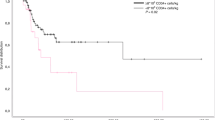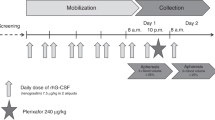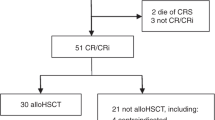Abstract
Current treatments for metastatic breast cancer are not associated with significant survival benefits despite response rates of over 50%. High-dose therapy with autologous bone marrow transplantation (ABMT) has been investigated, particularly in North America, and prolonged survival in up to 25% of women has been reported, but with a significant treatment-related mortality. However, in patients with haematological malignancies undergoing autologous transplantation, haematopoietic reconstruction is significantly quicker and mortality lower than with ABMT, when peripheral blood progenitor cells (PBPCs) are used. In 32 women with metastatic breast cancer, we investigated the feasibility of PBPC mobilisation with high-dose cyclophosphamide and granulocyte colony-stimulating factor (G-CSF) after 12 weeks' infusional induction chemotherapy and the subsequent efficacy of the haematopoietic reconstitution after conditioning with melphalan and either etoposide or thiotepa. PBPC mobilisation was successful in 28/32 (88%) patients, and there was a rapid post-transplantation haematopoietic recovery: median time to neutrophils > 0.5 x 10(9) l-1 was 14 days and to platelets > 20 x 10(9) l-1 was 10 days. There was no procedure-related mortality, and the major morbidity was mucositis (WHO grade 3-4) in 18/32 patients (56%). In a patient group of which the majority had very poor prognostic features, the median survival from start of induction chemotherapy was 15 months. Thus, PBPC mobilisation and support of high-dose chemotherapy is feasible after infusional induction chemotherapy for patients with metastatic breast cancer, although the optimum drug combination has not yet been determined.
This is a preview of subscription content, access via your institution
Access options
Subscribe to this journal
Receive 24 print issues and online access
$259.00 per year
only $10.79 per issue
Buy this article
- Purchase on Springer Link
- Instant access to full article PDF
Prices may be subject to local taxes which are calculated during checkout
Similar content being viewed by others
Author information
Authors and Affiliations
Consortia
Rights and permissions
About this article
Cite this article
Cameron, D., Craig, J., Gabra, H. et al. High-dose chemotherapy supported by peripheral blood progenitor cells in poor prognosis metastatic breast cancer--phase I/II study. Br J Cancer 74, 2013–2017 (1996). https://doi.org/10.1038/bjc.1996.669
Issue Date:
DOI: https://doi.org/10.1038/bjc.1996.669
This article is cited by
-
Should we continue to study high-dose chemotherapy in metastatic breast cancer patients? A critical review of the published data
Bone Marrow Transplantation (2003)
-
High-dose chemotherapy and stem cell transplantation for patients with stage IV breast cancer without clinically evident disease: correlation of CD34+ selection to clinical outcome
Bone Marrow Transplantation (2000)



